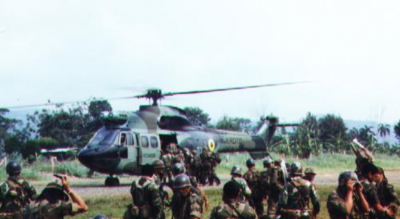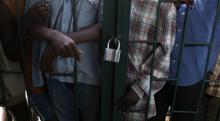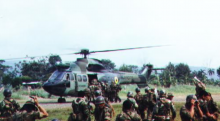Basic international humanitarian law (IHL) rules applicable to this situation:
Detainees must be provided with adequate food, water, clothing, shelter and medical attention.
In international armed conflicts, the ICRC must be granted regular access to all detainees to monitor their detention conditions and to restore contacts between detainees and their families.
Prisoners of war must be released and repatriated without delay after active hostilities cease.
Civilian internees must be released as soon as the reasons which necessitated internment no longer exist, and as soon as possible after active hostilities cease.
The case in brief
In January 1995, a border dispute between Ecuador and Peru erupted into armed conflict, resulting in arrests on both sides. In February, the parties agreed to end hostilities, reinforcing their commitment to the ceasefire and the pursuit of lasting peace through formal declarations.
As part of the ensuing peace process, Ecuador and Peru simultaneously released prisoners of war (PoWs) on two occasions. Several international actors facilitated and supported the releases.
IHL compliance highlights
- In cooperation with the relevant authorities, ICRC delegates visited and talked privately with civilian internees held by Ecuador and Peru in connection with the conflict.
- On 1 March 1995, in cooperation with the ICRC, Peru handed over two Ecuadorian PoWs to the Ecuadorian authorities, and Ecuador handed over seven Peruvian PoWs who had been interned in Ecuador.
- A second simultaneous release took place on 30 June 1995, in which four Ecuadorian and 11 Peruvian citizens were released and repatriated to Ecuador and Peru, respectively, with ICRC support. In a press release accompanying the releases, the Ecuadorian government acknowledged the contribution they would make to the wider peace process and confirmed its adherence to the provisions of article 118 of the Third Geneva Convention relative to the treatment of prisoners of war.
Case prepared by Emma Persson, James Patrick Sexton, Shaya Javadinia, with the contribution of Maria Querol Guillen and Eliza Walsh, LL.M. students at Leiden University, under the supervision of Professor Robert Heinsch, as well as Alla Ershova (Senior Researcher) and Ashley Peltier (Researcher), Kalshoven-Gieskes Forum, Leiden University.
A. PEACE AGREEMENTS SET THE STAGE FOR INITIAL PRISONER OF WAR EXCHANGE
[Source: ‘Declaración de Paz de Itamaraty entre Ecuador y Peru’, 17 February 1995, p. 1, available, at https://peacemaker.un.org/sites/peacemaker.un.org/files/EC%20PE_950217_Declaracion%20Itamaraty.pdf, accessed on 31 January 2021]
En la reunión de alto nivel diplomático de los países garantes del protocolo de Río de Janeiro [Argentina, Chile, Brazil, United States], los Vicecancilleres del Ecuador y del Peru, Embajador Marcelo Fernández de Córdoba, y Embajador Eduardo Ponce Vivanco, en representación de sus Gobiernos, confirman el cese de hostilidades entre el Ecuador y el Peru, conforme a los comunicados oficiales divulgados por los dos Gobiernos, a partir de las 12 (doce) horas – hora de Quito y Lima – del 14 de febrero.[1]
Para consolidar el acuerdo de cese del fuego, y a fin de evitar nuevas confrontaciones que alteren las relaciones de paz, amistad y buena vecindad entre Peru y Ecuador.
[...]
[Source: ‘Press release issued on 28 February 1995 by Ministry of Foreign Affairs of Ecuador’’, 28 February 1995, annexed to ‘Letter dated 2 March 1995 from the Permanent Representative of Ecuador to the United Nations addressed to the Secretary-General’, p. 2, available at https://peacemaker.un.org/sites/peacemaker.un.org/files/EC%20PE_950228_MontevideoDeclaration.pdf, accessed on 31 January 2021]
[...] The Ministry of Foreign Affairs of Ecuador announced that, following a lengthy meeting held today, 28 February 1995, in Montevideo, the Ministers for Foreign Affairs of the Guarantor Countries of the Rio de Janeiro Protocol, together with the Ministers for Foreign Affairs of Ecuador and Peru, signed the Montevideo Declaration, in which they emphasized their political will to promote the peace process and the cessation of hostilities in the conflict between the two countries, in accordance with the Itamaraty Declaration, which was signed on 17 February 1995.
[...]
B. FIRST EXCHANGE OF PRISONERS OF WAR ON 1 MARCH 1995
[Source: ICRC, ‘Ecuador/Peru: aftermath of border dispute’, 22 March 1995, available at p. 27, https://library.icrc.org/library/docs/DOC/DOC_00384.pdf]
[...] On 1 March the authorities of the two countries released two Ecuadorian prisoners of war held in Peru and seven Peruvian POWs interned in Ecuador. ICRC delegates had talks in private with each of the prisoners, in accordance with the institution's customary working procedures, and the men were then repatriated under the ICRC's auspices. So far delegates have had private interviews with about 30 civilian internees on both sides. Not all of them have been released to date.
[...]
The hostilities came to an end with the signing of a cease-fire agreement in Montevideo on 28 February, under the auspices of the four guarantor nations of the Rio Protocol of 1942.
[...]
C. SECOND EXCHANGE OF PRISONERS OF WAR ON 30 JUNE 1995
[Source: ‘Letter dated 3 July 1995 from the Permanent Representative of Ecuador to the United Nations addressed to the Secretary-General’, A/49/939, S/1995/545, 3 July 1995, pp. 1-2, available at https://digitallibrary.un.org/record/198670?ln=en, accessed on 31 January 2021]
Letter dated 3 July 1995 from the Permanent Representative of Ecuador [Guillermo G. Camacho] to the United Nations addressed to the Secretary-General
I have the honour to transmit to you herewith a copy of a press release dated 30 June 1995 issued by the Ministry of Foreign Affairs of Ecuador announcing the simultaneous repatriation of four Ecuadorian and 11 Peruvian citizens who had been detained in Peru and Ecuador, respectively, as a result of this year’s armed conflict between Ecuador and Peru.
I should be grateful if you would have this note and its annex distributed as a document of the General Assembly, under agenda item 74, and of the Security Council.
Annex
Press release dated 30 June 1995 issued by the Ministry of Foreign Affairs of Ecuador
The Ministry of Foreign Affairs has announced that, as a result of the talks held last week at Brasilia between the Deputy Ministers for Foreign Affairs of Ecuador and Peru, the Ecuadorian and Peruvian citizens detained in Peru and Ecuador, respectively, as a result of the armed conflict will be repatriated simultaneously within the next few hours.
The repatriation decision was motivated by the Government’s desire to enable the four Ecuadorians held in Peru to return home as soon as possible and resume their normal lives. Furthermore, the Ministry of Foreign Affairs, with the support and collaboration of the relevant military and police authorities believed that the repatriation process would make a genuine and effective contribution to the improvement of relations between Ecuador and Peru.
[...]
Ecuador, which has consistently demonstrated its respect for and strict observance of humanitarian law, has thus complied with the provisions of article 118 of the third Geneva Convention relative to the Treatment of Prisoners of War.
The International Committee of the Red Cross (ICRC) worked closely with the Ecuadorian authorities to bring to a satisfactory conclusion the efforts begun several months ago by the Ministry of Foreign Affairs to secure the simultaneous repatriation of prisoners.
The ICRC representative, and a doctor from that organization, Dr. Daniel Koch, visited the prisoners this morning. Dr. Koch certified that the Peruvian citizens are in good physical and mental health and will accompany them back to Lima.
Discussion
I. Classification of the Situation and Applicable Law
1. How would you classify the situation between Ecuador and Peru in January-February 1995 before hostilities ended? (GC I-V, Art. 2, Art. 3; P I, Art. 1; P II, Art. 1)
2. When do obligations regarding POWs and civilian internees arise? Is a ceasefire agreement necessary to trigger these obligations? (GC III, Art. 110, Art. 118; GCIV, Art. 134)
II. Exchange of Prisoners of War
3. What is the timeline for the parties to release and repatriate the prisoners of war under IHL? What are the potential challenges in satisfying the obligation to exchange POWs ‘without delay after the cessation of active hostilities’? (GC III, Art. 118; CIHL Rule 128)
4. How do members of armed forces gain POW status? Can this status ever be denied? Are civilians eligible for POW status? How do the guarantees afforded to civilian internees differ from those guaranteed to POWs? (GC IV, Art. 3; GC III, Art. 4, Art. 118; GC IV, Art. 4; P II, Art. 4(1), Art. 5; Art. 118, Art. 119; CIHL, Rule 128)
5. What obligations do states have regarding the release of POWs? In the present case, Ecuador and Peru exchanged POWs simultaneously. Is such reciprocity a requirement under IHL or can parties also release POWs unilaterally? (GC III, Art. 118, Art. 119; CIHL, Rule 128)
6. Do parties to the conflict have an obligation to provide humanitarian access to POWs? (GC III, Art. 126; GC IV, Art. 76; CIHL Rule 124)
III. Elements Contributing to Respect for IHL
7. (Document C) In its letter to the United Nations Security Council, Ecuador specifically mentions its compliance with Article 118 of the Third Geneva Convention (1949). Why is it beneficial for states to highlight their compliance with IHL? In your opinion, could the parties’ international reputation be a motivating factor for their compliance with IHL?
8. (Document A, Source 2) To what extent did the Guarantor Countries (Argentina, Brazil, Chile, and the United States) have an influence on the exchange of POWs between Ecuador and Peru? Do you think that the exchanges would have been possible without their facilitation? What may have motivated the Guarantor Countries to encourage the POWs’ exchanges?
9. (Document C) As stated by Ecuador, “the repatriation process would make a genuine and effective contribution to the improvement of relations between Ecuador and Peru”. To what extent do you think these mutual exchanges of POWs contributed to the peace process between Ecuador and Peru?
10. (Documents B and C) In your opinion, what are the benefits of having humanitarian organisations facilitate and support the exchange of POWs? Do you think the involvement of humanitarian organisations influences how detainees are treated before repatriation?
[1] Translation by the KGF researchers: “At the high-level meeting between the guarantor countries of the Rio de Janeiro protocol, the Deputy Ministers of Ecuador and Peru, Ambassador Marcelo Fernandez de Cordoba, and Ambassador Eduardo Ponce Vivanco, in representation of their Governments, confirm the end of hostilities between Ecuador and Peru, in line with the official statements disclosed by the two Governments, starting from 12 (twelve) o’clock - Quito and Lima time - on February 14th. To consolidate the ceasefire agreement, and in order to avoid new confrontations that could alter the relations of peace, friendship and good neighborliness between Peru and Ecuador.”





